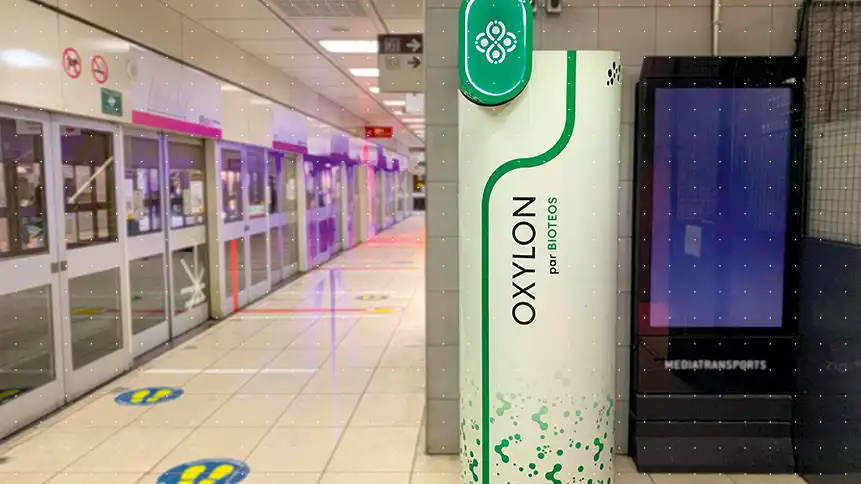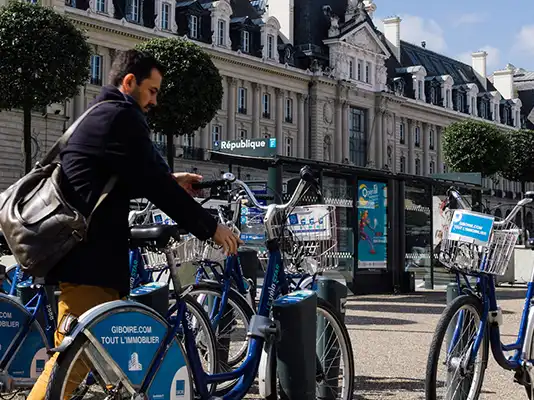As a global mobility player, Keolis engages in innovation to imagine and deploy safe and sustainable mobility to serve every community, and to improve everyone's quality of life. This ambition, expressed in its Corporate Purpose, is supported by concrete actions, an ecosystem of partners and an open innovation approach. Always at the forefront, Keolis uses new technologies to improve safety and quality of service, for people and the environment.
Tangible innovations
Innovation in the Keolis DNA
Innovation is a major lever for development, and is an integral part of Keolis' corporate purpose. In each subsidiary and each discipline, the Group innovates to improve the passenger experience, meet the challenges of public transport authorities (PTAs) and enhance operational performance. The aim is to deliver an increasingly reliable, safe and sustainable mobility service.
Innovation for safety and the energy transition
Keolis uses innovation to serve two priorities: safety in transport and reducing the environmental footprint of mobility. In Rennes, Lille, micro-sensors, microalgae cleaners and fine particle extractors are being tested to analyse and purify the air, and reduce the harmful effects of pollution on the health of residents and the planet.

Keolis, a pioneer autonomous shuttles
Keolis has been operating autonomous shuttles open to the public since 2016, with over 55 deployments worldwide and more than 218,000 passengers carried. Projects in Lyon, Las Vegas and Gothenburg illustrate Keolis' ability to integrate these innovative solutions in a variety of environments, from city centres to tourist spots. The ambition to achieve 100% autonomous driving without an operator on board ("No Op") was achieved in 2022 at the Autonomous Mobility Test Site (SEMA) in Châteauroux. In 2026, this will be replicated at full scale in Châteauroux city centre.
Collaborating to imagine the solutions of tomorrow
Open innovation
Keolis puts people at the heart of innovation. The Group has deployed an innovation ecosystem to invent new services and tangible solutions, in line with passenger expectations and the challenges of each community.
With public transport authorities, local authorities, start-ups, universities, associations and passengers all contributing their expertise, Keolis uses an iterative approach to exchange, share and experiment in an effort to collaboratively build a form of mobility that is shared, inclusive and sustainable, and supports local development.
A symbol of this collaborative innovation is the Futura-Mobility think tank, a forum for sharing knowledge and resources between mobility players, of which Keolis is a founding member.
Open by Keolis: an innovation accelerator in support of communities
In collaboration with public transport authorities (PTAs), Keolis has developed the Open by Keolis lab network. These labs are set up locally to meet the specific needs of each community.
In the firm belief that performance is born out of sharing, Keolis brings the best ideas to fruition by duplicating them around the world and adapting them to each community. To capitalise on experience, the Open by Keolis network brings together the Group's local collaborative Labs.
A dynamic driven transversally by the Keolis Group, prom oting the design of solutions as close as possible to users.
Bringing together more than 120 innovation ambassadors around the world, the Keolis Innovation Club fosters creativity and encourages the sharing of experience. As a forum for meetings and exchanges, the club has a dual objective: enable each subsidiary to put forward value-generating ideas, and identify innovative projects that can be replicated in other subsidiaries.
"Innovation is the key to devising and deploying safe and sustainable transport solutions for every community. Innovation contributes to a personalised, seamless passenger experience, in particular by offering alternatives to solo car use."
Arnaud Julien, Chief Innovation, Data and Digital Officer at Keolis
Enhancing the mobility experience
Data and AI au the heart of innovation
Whether to adapt services, gain a better understanding of usage or improve control over operations, data and AI are powerful innovation drivers. For example, the data collected in vehicles provides a real-time and predictive view of the number of passengers on board, and helps to deploy connected, preventive and predictive maintenance. Passenger data (UX data) helps us to better understand and improve the user experience. In Australia and at Mont-Saint-Michel in France, the Group is also using artificial intelligence to anticipate passenger numbers in real time and reduce waiting times.
Banking on low-tech innovation
Innovation at Keolis also comes in low-tech form, known as "frugal innovation". "Nudges" are an example of this. The idea is to change people's behaviour by giving them a small "nudge" with prompts such as public address announcements, stickers or signs. This is a gentle and often inexpensive method based on behavioural science. It encourages individuals to adopt positive behaviour, without ever forcing it upon them. The unintrusive method was trialled in Dijon in 2022 and proved its effectiveness in encouraging multimodality.
Using data to improve the performance of multimodal networks
With the Patterns and Impulse solutions, Keolis is reinforcing its understanding of multimodal mobility and its ability to analyse the performance of its transport networks. Based on the evaluation of GPS data and connected objects, Patterns provides a better understanding of mobility dynamics and the stages of multimodal journeys. Impulse uses data from operating systems and third-party data to analyse the performance of a transport network (ridership, punctuality, quality of service, etc.). Using this data, Keolis and the public transport authorities (PTAs) can optimise the transport services on offer.
